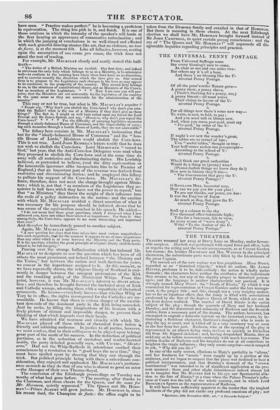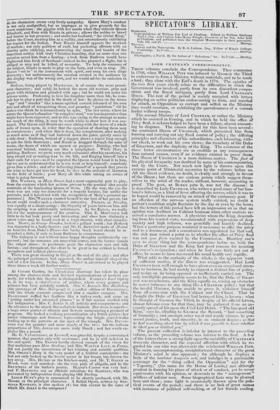'TIE THEATRES.
TRAGEDY resumed her sway at Drury Lane on Monday, under favour- able auspices. Macbeth was performed with equal force and effect, both us regards the acting and the scenic arrangements, as at Covent Garden last season; for, besides 3IAeat.:Anv and Mrs. WARNER in the principal s characters, the subordinate parts were ably filled by the Lieutenants of the great Captain.
The second act of' the new regime was less propitious. Mary Stuart, regarded us an " historical tragedy," which its author, Mr. JAMES HAYNES, professes it to be, thils entirely : the action is wholly melo- dramatic; the characters have neither the attributes of the individuals they assume to be, nor any of the dignity proper to historical person- ages ; and the language is neither characteristic nor poetical. It is wrongly named Mary Stuart: the " Death of Rizzio," by which it was announced for representation at Covent Garden under the late manage- ment, is the proper title : and this, thought not a very weighty matter, has so far an injurious effect, that the fancy is filled with associations awakened by the fate of the hapless Queen of Scots, which are not in the least degree realized. The murder of David Rizzio is the entire subject of the play ; though the quarrels of Mary and her husband Darnley, and the discontent and animosity of Ruthven and the Scottish nobles, form a necessary part of the drama. The author, however, has attempted to engraft a domestic interest on the historical events, by in- troducing a fictitious character, Ruthven's daughter ; who is made to play the spy at court, and is killed off in a very summary way so soon as she has done her part. ft uthven, who at the opening of the play is represented in an almost dying state, revives as quickly as Richelieu did from his feigned sickness ; and, having despatched Rizzio, dies as suddenly as he before recovered—certainly with much less reason. The sudden deaths of Rntliven and his daughter do not at all contribute to heighten the tragic influence ; they only create surprise—one is tempted to ask, " Why did you die ?" In one of the early scenes, allusions to Mary's partiality to "aliens,' and her fondness for "music" were caught up by a portion of the audience, and we began to suspect that the piece was destined to bear a political interpretation, and that Darnley's demand of the "crown matrimonial" was intended to be of significant application at the pre- sent moment: these and other slight coincidences indeed almost led. us to imagine that Mr. HAYNES had in his eye our Spectatorial allu- sion to the fate of Rizzio,* at a time when the Palace Premier's influ- ence at Court was the talk of the whole country, and in -which Lord BROUGHAM figures as the representative of Ruthven. It will have been sufficiently apparent to the reader that the tragical incidents of the play did not excite any profound emotions of pity ; nor • Spectator, 10th November 1838; art. " A Favourite Subject."
do the characters create very lively sympathy. Queen Mary's conduct is not only undignified, but so improper as to give grounds for the worst suspicions : she giggles with her maids when they ridicule Queen Elizabeth, and flirts with Rizzio in private ; allows the nobles to brawl and banter in her presence; and snubs her husband," the titular King," before the Court, treating him as a nullity, and ostentatiously exhibiting her regard for the Italian. Poor Rizzio himself appears the meekest of mortals ; not only guiltless of craft, but pocketing affronts with an
alacrity quite edifying, and deprecating the taunts and insults of the imperious nobles with truly Christian humility, that on more than one occasion saved him from a beating: a look from Ruthven would have frightened hint forth of Scotland—indeed helms planned a flight, but is obliged to stay and be killed, of necessity. To help the romance of the subject, Rizzio is made to play on the harp, and even to sing. Mr. ELTON "set to" at the instrument with spirit, and sung his own dirge discreetly ; but unfortunately the emotion created in the audience by this display was of the wrong sort, and we would advise its omission in future. Ruthven, being played by Miens:Ayr, is of course the most promi- nent character ; and nobly he looked the stern old warrior, grim and gaunt with sickness and grizzled with age ; but he could not make his actions noble. Professing to love his daughter more than life, he com- pels her to play a part that is the death of her : he glazes on the terms "spy" and "murder" like a mean-spirited coward ashamed of his own acts and afraid of recognizing them, and preaches " patriotism" till he makes one think he is actuated only by spite. The last scene, where lie enters the Queen's chamber "in complete steel," was less impressive than might have been expected; and as this was owing to the attempt to make too much of the thing, it may be worth while to show how it was ma- naged. The Queen and Rizzio are seen sitting with the doors of a whole suite of rooms open, in order that the operation of shutting them may be conspicuous ; and when this is done, the conspirators, after making as much noise as if they bad battered down the gates, quietly enter by a side-door : Ruthven, instead of a dagger, draws a rapier long enough to spit the little Secretary; and Rizzio is dragged through the suite of rooms, the doors of which are opened on purpose ; Darnley, who had remained behind, running out like a lamplighter. While Mary is sobbing, Ruthven rei.Inters;very much exhausted after his exertions, his long sword red as scaling-wax to the hilt, and flinging himself into a chair calls for wine—as if he expected the Queen would hand it to him, but we are to understand that he is too weak to help himself : somebody gives him a drink ; and after delivering himself of a speech that proves the wine to have got into his head, he dies in the attitude of Marmion on the field of battle ; poor Mary all this while taking no notice of what is going forward. Mrs. WARNER, as Mary Stuart, had a most ungrateful part to play, from the contrast which her actions present to the poetical idea people entertain of the thseinating Queen of Scots. (By the way, the cap she wore was not only too domestic for a tragedy heroine, but unlike the portraits, and it interfered with the recognition of Mary's personal ap- pearance.) Mrs.'WARsEn exerted herself to the best of her power, but no art could render such a character attractive. Plumps, as Darnley, was equally at a disadvantage : the disparity of years between him and the stripling was additionally unfortunate. As for ELTON, we really felt for the unpleasantness of his position. Miss E. MovrAct:}: had
little to do but look pretty and interesting, and show how distinctly a sweet voice may be heard even in a large theatre, with clear enuncia- tion. Hoses:, as George Doug/as, looked a gallant youth ; but Botha:et/
was degraded to a bully-hector; and Mr. 0. BENNETT made of Morton an Israelite from Duke's Place—his bushy black beard should be re • trenched a little, if only to keep Ruthven in countenance.
The dialogue is not without some happy thoughts antithetically ex- pressed; but the sarcasms are somewhat coarse, and the banter sounds like vulgar abuse : in passionate parts the characters rant and talk fustian ; and throughout, the effort to be great is too evident in forced metaphors and inflated phraseology.
There was great shouting in the pit at the end of the play ; and after the principal perlbrmers had appeared, the author himself obeyed the call of a few friends. In fine. .3/org Stuart is advertised to be played three times a week till further notice.



























 Previous page
Previous page